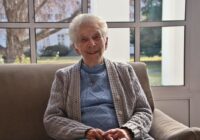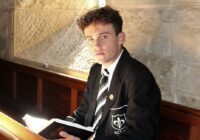Birds of a feather
It’s easier to find a Crowned Eagle’s egg on Hilton College’s estate than it is to find James Walters (1991, Falcon). Matt Fitzsimons (1991, Ellis) can attest to this: he spent almost 10 years looking for his nature-loving, social media-shy old school mate.
It wasn’t until this year, when Matt’s son Adam started at Hilton College, that he eventually managed to track down James in sleepy Simon’s Town.
A man who marches to his own beat, James has been the custodian of the sacred “raptor journal”, penned by his late father Brian Walters (1955, McKenzie), documenting and mapping out the raptors he encountered across the 1600-hectare Hilton College estate and beyond.
Brian’s journal was a source of delight for James, Matt and his twin brother Roger in their time at Hilton, using them to trace an expansive network of birds’ nests that were still there a generation on – from Crowned Eagles, Sparrowhawks, Goshawks, kestrels and kites to owls and harriers.
“We would go straight [to the valley] after school at 2pm and come back in time for dinner,” says James. “Gradually, we ventured further and further into the estate, finding eagles’ nests and writing our own notes, taking photographs – all inspired by my dad’s journals. We would climb trees in search of the nests, having adventures, sometimes sleeping out on the estate.”
It was a reprieve from dorm life and academics, James says. “Like church, it was spiritual to be out there. It wasn’t just the birds. Our time on the estate taught us that we belonged to a much bigger environment … it was formative, bedrock material.
“In the modern world, saturated with phones and screens, people don’t know how to use their eyes anymore. The fact that Hilton boys get to go out there into the wild and look at the natural world rather than videos and all that garbage, they will learn to use their eyes.”
It is this and more that Matt wants for his son Adam and his friends. “It’s up to them to write the next chapter in the journal, and to enjoy the estate.”
Earlier this year, Matt convinced James to make his first trip back to Hilton College since he left. This culminated in James gifting to the school his father’s precious journal and another of his bird books, cataloguing birds spotted at Hilton College and in Nottingham Road.
These books now enjoy pride of place in the school’s museum. The raptor journal is a treasure trove of stories, telling of how the boys in Brian’s days would rear raptors from eggs or chicks. By the time the birds reached adulthood, they were quite tame.
“Some of the birds were quite funny. One particular kite dived-bombed a teacher and stole his toupee. The boys went wild,” says James.
Crowned Eagles lay one or two eggs only, and the older chicks are known to kill the younger ones. This inspired Hilton boys in the 1950s to rescue chicks. The journals tell of them rearing one such chick into a huge Martial Eagle. “It became too much, so my dad decided to send the bird to Cape Town, to falconer and artist Heinrich von Michaëlis. He and the guys put the eagle in a box and posted it to Cape Town by train.” The box had no air holes or food but the bird survived the trip, and Michaëlis cared for it before sending it to the Hamburg Zoo in Germany.
“Shaka”, an eaglet rescued at six days old, wasn’t as lucky. According to the journal: “For the first fortnight we had him, we kept him under a homemade incubator. When he was six weeks old, he went with Bryan Eccles to N. Rhodesia. It was at this stage that we noticed he had a weak leg. This was probably due to an insufficiency of calcium, although we gave him a fair amount of calcium lactate. Bryan was lucky to get him through customs… A vet was consulted about his leg, but nothing could be done.” Shaka got mango worms and died, and Brian muses in the journal, “Perhaps fate only allows one eagle to be reared per nest each year.”
During their time at Hilton, Walters and the Fitzsimons twins thought they had discovered a new harrier which they called the “Walfitz” harrier and submitted to the South African Rare Bird Society.
At the ceremony marking the donation of the books to the school, they were symbolically handed over to a group of junior boys who are environmental enthusiasts. These boys will write their own stories of adventures on the estate – and maybe even discover new species of birds.





